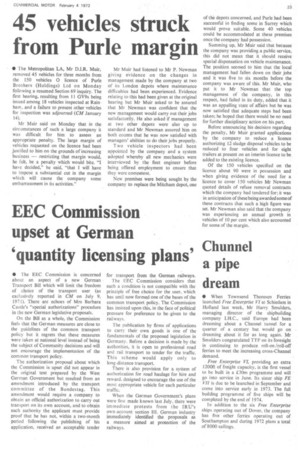45 vehicles struck from Purle margin
Page 25

If you've noticed an error in this article please click here to report it so we can fix it.
• The Metropolitan LA, Mr D.I.R. Muir, removed 45 vehicles for three months from the 150 vehicles 0 licence of Purle Brothers (Holdings) Ltd on Monday following a resumed Section 69 inquiry. The first hearing, resulting from 11 GV9s being issued among 18 vehicles inspected at Rainham, and a failure to present other vehicles for inspection was adjourned (CM January 14).
Mr Muir said on Monday that in the circumstances of such a large company it was difficult for him to assess an appropriate penalty. The large margin of vehicles requested on the licence had been justified to him on the grounds of increasing business — restricting that margin would, he felt, be a penalty which would bite. "I have decided," he said, "that I will have to impose a substantial cut in the margin which will cause the company some embarrassment in its activities." Mr Muir had listened to Mr P. Newman giving evidence on the changes in management made by the company at two of its London depots where maintenance difficulties had been experienced. Evidence relating to this had been given at the original hearing but Mr Muir asked to be assured that Mr Newman was confident that the new management would carry out their jobs satisfactorily. He also asked if management at two other depots were also up to standard and Mr Newman assured him on both counts that he was now satisfied with managers' abilities to do their jobs properly.
Two vehicle inspectors had been appointed by the company and a system adopted whereby all new mechanics were interviewed by the fleet engineer before being offered employment to ensure that they were competent.
New premises were being sought by the company to replace the Mitcham depot, one of the depots concerned, and Purle had been successful in finding some in Surrey which would prove suitable. Some 40 vehicles could be accommodated at these premises once the company had possession.
Summing up, Mr Muir said that because the company was providing a public service, this did not mean that it should receive special dispensation on vehicle maintenance. The position seemed to him that the local management had fallen down on their jobs and it was five to six months before the company was aware of this. Mr Muir, who put it to Mr Newman that the top management of the company, in this respect, had failed in its duty, added that it was an appalling state of affairs but he was now satisfied that adequate steps had been taken; he hoped that there would be no need for further disciplinary action on his part.
Before announcing his decision regarding the penalty, Mr Muir granted applications by the company to reduce a licence authorizing 12 sludge disposal vehicles to be reduced to four vehicles and for eight trailers at present on an interim licence to be added to the existing licence.
Of the 150 vehicles specified on the licence about 90 were in possession and when giving evidence of the need for a licence to cover 150 vehicles Mr Newman quoted details of refuse removal contracts which the company had tendered for; it was in anticipation of these being awarded some of these contracts that such a high figure was set. Mr Newman also said that the company was experiencing an annual growth in vehicles of 10 per cent which also accounted for some of the margin.














































































































































